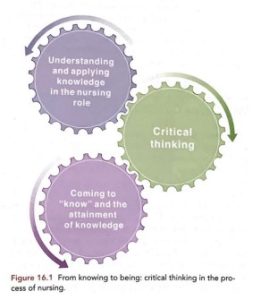Critical Thinking
Critical Thinking in Nursing
Maggie Convey and Sarah Malo
All nursing regulatory bodies and associations cite the importance of active, critical thinking in all clinical contexts. Nursing is not a profession of complacency. In your undergraduate experience, you will have direction and opportunities to practice you critical thinking, clinical reasoning, and clinical judgement skills in all nursing courses. There is a clear connection between knowledge and knowing, critical thinking and the application of such knowledge into the role of the nurse, as seen below (Raymond-Seniuk & Profetto McGrath, 2017).

Nursing care and practice comes from thinking about and identifying knowledge from a nursing encounter, considering the nursing role, and considering the broader context to promote action.
Critical Thinking Indicators
From Rosalinda Alfaro-Lefevre (2019), personal critical thinking indicators offer an opportunity to reflect on your current thinking patterns.

Engaging and questioning your current practice is a form of self-reflection. Honest and ongoing evaluation of your own progress is a necessity in nursing. Self-reflection can be fostered by asking yourself the following questions: What am I doing well? How am I doing well? What might I benefit from improving or changing? How might I go about doing so?
Reflecting on your own values, assumptions, biases, and thinking are effective ways to improve the quality of your thinking.
Media Attributions
- Screenshot 2021-10-14 112300
